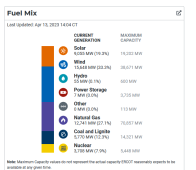or at least going on a very long Hiatus.
So I built a passive solar house- the roof is 35° slope facing 4° west. no penetrations, no shading. I built it to be perfect for solar panels.
BUT, net metering ended two months ago before I could get in and I have spent the last two months trying to make solar with batteries make sense, and I have finally come to the conclusion that, right now, I cant.
energy averages $.11/kwh, down from $.14/kwh last year.
In the winter my house will use very little energy for HVAC, which is the main load for houses here my part of Texas. with no hvac system, on sunny days the house sits about 75 degrees due to all the radiant heat coming in through the south facing windows.
If I get 10 years out of an inverter and 6000 cycles out of the battery, I basically break even.
you guys are a fun but crazy bunch who persist through headaches of solar, and from reading on here, they are many. I don't have the patience to deal with all that comes with Solar PV and batteries
I have decided to do three things.
1. Wait for energy prices to go up and for battery
and inverter prices to come down
2. use a clothes line to dry clothes and save money there
3. Use a cheap diy Solar THERMAL hot water system to heat my water.
however, I still have a decision to make about backup for my well pump. we hardly ever lose power and I have 25 gallons of reserve in the pressure tank but if we have a freeze we could lose power for over a day. I'm going between an inverter/ battery , or a generator, and frankly the generator is winning right now :D



